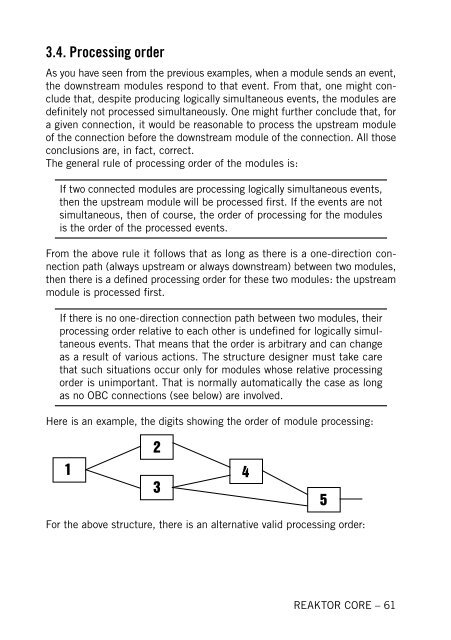1. First steps in Reaktor Core - Native Instruments
1. First steps in Reaktor Core - Native Instruments
1. First steps in Reaktor Core - Native Instruments
You also want an ePaper? Increase the reach of your titles
YUMPU automatically turns print PDFs into web optimized ePapers that Google loves.
3.4. Process<strong>in</strong>g order<br />
As you have seen from the previous examples, when a module sends an event,<br />
the downstream modules respond to that event. From that, one might conclude<br />
that, despite produc<strong>in</strong>g logically simultaneous events, the modules are<br />
def<strong>in</strong>itely not processed simultaneously. One might further conclude that, for<br />
a given connection, it would be reasonable to process the upstream module<br />
of the connection before the downstream module of the connection. All those<br />
conclusions are, <strong>in</strong> fact, correct.<br />
The general rule of process<strong>in</strong>g order of the modules is:<br />
If two connected modules are process<strong>in</strong>g logically simultaneous events,<br />
then the upstream module will be processed first. If the events are not<br />
simultaneous, then of course, the order of process<strong>in</strong>g for the modules<br />
is the order of the processed events.<br />
From the above rule it follows that as long as there is a one-direction connection<br />
path (always upstream or always downstream) between two modules,<br />
then there is a def<strong>in</strong>ed process<strong>in</strong>g order for these two modules: the upstream<br />
module is processed first.<br />
If there is no one-direction connection path between two modules, their<br />
process<strong>in</strong>g order relative to each other is undef<strong>in</strong>ed for logically simultaneous<br />
events. That means that the order is arbitrary and can change<br />
as a result of various actions. The structure designer must take care<br />
that such situations occur only for modules whose relative process<strong>in</strong>g<br />
order is unimportant. That is normally automatically the case as long<br />
as no OBC connections (see below) are <strong>in</strong>volved.<br />
Here is an example, the digits show<strong>in</strong>g the order of module process<strong>in</strong>g:<br />
�<br />
��<br />
��<br />
��<br />
For the above structure, there is an alternative valid process<strong>in</strong>g order:<br />
��<br />
��<br />
REAKTOR CORE – 61










